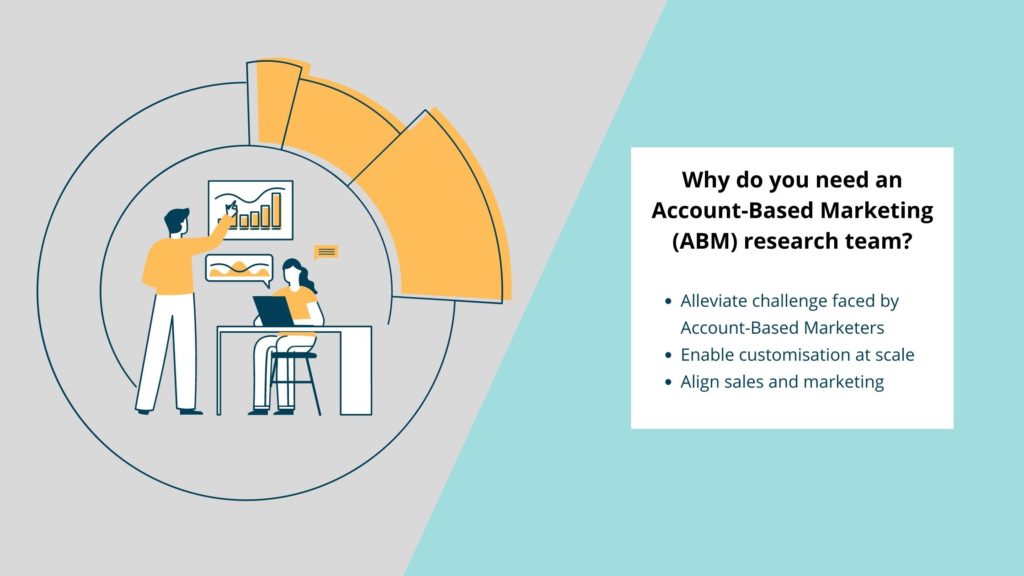Going into 2022, the need for personalization will be the driving force for companies to adopt ABM as their key strategy. With a surge in people working from home, B2B people have become more selective with whom they speak, it has rather become more about the “trust factor”. And, the best way to gain trust with your high-value accounts is by doing in-depth research about them. Get your sales to research on your must-win accounts or simply hire a remote ABM research team to do the job. This will certainly help you to truly understand your target accounts.
What does truly understanding your target accounts mean?
Simple! Learn anything and everything you can about your target account. Find out what gains they are after, what their pains are, and how you can help them eliminate those pains. Easy as it may sound it is a tedious process. Pulling data and information from different sources and converting it into insight is a heavily time-consuming task. However, the effort surely is worth every hour spent.
Leveraging simple desk-based research to collect insights about a company, strategies that they are embracing as well as learning about their sales and marketing technology stack can help a great deal. Also, gather intelligence about their needs, and strategic priorities through various sources such as executive interviews, press releases, social media sites and investor presentations.
With the B2B landscape shifting towards a trust economy, understanding target accounts priorities and knowing ins-and-outs of the industry they cater to is what will help sales reps and marketers thrive in 2022 and beyond. After the pandemic, Account-Based Marketing (ABM) has continued to gain traction as an instrumental B2B marketing strategy that drives results.
And, why now is the time for Account-Based Marketing (ABM)?
Post-COVID, companies are turning instinctively to account-based marketing for building their sales pipeline. While companies are adapting to the new normal, the way they have been using the ABM program has also changed. Companies have shifted their focus towards growing existing accounts rather than breaking into new accounts or industries. It makes more sense now to narrow down the prospect list and chase them with personalized efforts.
Hubspot states that in 2021, 70% of marketers report using ABM, up from 15% in 2020. Companies with mature ABM programs have increased the amount of investment despite a reduction in their overall budget. This clearly shows that ABM can generate ROI even during a global pandemic.
“79% of active ABM adopters have been successfully generating ROI”
As ABM is evolving to become more data-intrinsic and relationship-focused, it is important to deliver messages that show trust and empathy. Be it B2C or B2B, customers prefer personalized offers and campaigns. This is the reason why email marketing campaigns are unbelievably successful than other forms of inbound and outbound marketing.
Why do you need an Account-Based Marketing (ABM) research team?
Research shows that 87% of marketers that measure ROI say that ABM outperforms every other marketing investment.
Let’s talk about large enterprise companies that are trying to sell into even larger accounts. They will most certainly have to invest heavily in resources to develop a deep understanding of each account. What if you had access to a research team? A research team that can not only help you uncover your target accounts’ priorities but also give you intel on how you can realign your value proposition. Even qualify the right ABM accounts to go after. Having enough information about your target accounts can give your sales reps an edge when they go on their prospecting journey.
An Account-Based Marketing Insight program supported by a data-driven approach to research will yield positive results. Research is of profound importance in terms of delivering personalization to accounts, and with organizations facing difficulty in delivering personalization. Moreover, research can be the answer to solving problems that companies face to achieve higher personalization levels.

Alleviate challenges faced by Account-Based Marketers
Account-based marketing is a data-driven approach, that relies heavily on the right data to fuel its progress. One of the common challenges faced by marketers is securing the right data and insight. While we continue to operate during uncertain times, there is a need for companies to invest in data and insight. Due to this, B2B marketers are turning towards research companies for their ABM insight requirement.
One of the most efficient ways to gather insights is through desk research. Desk research uncovers relevant insights at precision. To ensure the effectiveness of targeted marketing strategy, insights on the firmographic, technographic, key executives, and the industry they operate in are provided through desk research. A huge difference lies in asking prospects what challenges they are facing rather than understanding the challenges the large enterprise accounts are facing.
Enable customization at scale
Marketers are investing in all three types of ABM to provide ‘depth and breadth of account coverage’. For one-to-one ABM, one-to-few ABM, and one-to-many ABM programs, marketers are leveraging structured research in the form of both industry insight as well as account insight for achieving success. Programs like executive-to-executive relationship programs as well as account-specific thought leadership programs, structured research helps you achieve customization at scale.
Align sales and marketing
ABM contributes a lot to making business goals simple: winning more accounts. ABM being an integrated approach, helps to identify target accounts, map them and align sales initiatives. Since ABM requires both marketing and sales to work closely, unity is brought in terms of data and insight. With both sales and marketing trying to win the same account, sales reps are less likely to be wasting time following up on uncertain leads. Rather, this leaves time and effort to nurture a qualified, targeted lead.
Combined sales and marketing efforts will open doors for launching personalized campaigns. One of the ways to offer personalization is through high-quality relevant content. Building high-quality relevant content is only possible if you are well-versed with your target audience’s priorities and challenges.
How have we been helping companies adopt ABM?
Moving into 2022, companies are realizing the value of data and insight. With face-to-face meetings almost impossible, it has been even more difficult to understand your target accounts. With the growing number of queries that we’ve been receiving, we thought this would be the best time for us to share how research has been imperative for many of our clients.
We’ve been helping B2B enterprises with:
A 360-degree insight solution on enterprise accounts to give deep-dive insight at an account level to help marketing teams run targeted campaigns. ABM Account Insight is commonly used by the head of sales to assess revenue potential, account managers to manage relationships, copywriters to build account-specific content, and project managers who are overseeing ABM campaigns.
An industry-targeted insight solution that empowers Account-Based Marketing (ABM) campaigns with industry-level intelligence by uncovering the trends and forces that are driving the targeted industry forward. With industry insight in place, account owners and sales can understand the waters each one of their target accounts is swimming in, ABM strategists who are overseeing the entire ABM campaign to ensure personalization across target verticals, and account managers to spot additional opportunities triggered by opportunities at industry level.
Critical insight on what competitors are currently doing, and what they’re likely to do in the future, to help improve the quality of strategic decisions. Competitive intelligence has proved to be extremely helpful to identify and cover any go-to-market gaps that competitors might be adopting.
Persona insight gives you all the necessary information about the decision maker’s priorities, opportunities, possible areas of investment, and other team members to note.
We’ve been providing account dossiers to our clients on target accounts identified by them. Many of the clients have also approached us to build custom industry insights for their one-to-few ABM campaigns. In one-to-few ABM, you target a relatively smaller number of accounts with a similar profile. This allows marketers to minimize cost and increase conversion possibilities across accounts instead of focusing on a single account. One-to-few ABM offers industry insights on key sectors and is for companies that are looking to dive into ABM and adopt nuanced marketing practices.
To conclude…
During the pandemic, we have witnessed ABM as an extremely effective strategy to secure relationships with existing customers. Account-based Marketing (ABM) has been ranked in the top five marketing priorities for the past eight years in ITSMA’s survey, along with brand differentiation, demand generation, marketing’s digital transformation, and sales and marketing alignment.
Having a research team for a structured research program in place alleviates the lack of data and insight problems for any ABM program. With a remote research team, customization at scale can be achieved for any undergoing ABM campaigns. A remote team for the insight program is crucial and highly recommended for understanding the insight needs of B2B sales reps. ABM doesn’t just ask for alignment between sales and marketing teams – it forces teams to align because personalization at the account level requires sales and marketing to be in sync for account-specific messaging.
We have helped numerous ABM agencies/teams with insight needs in the past with their ABM strategy directly or indirectly. If you seek insight support for your ABM campaigns – be it 1-to-Few, 1-to-Many, or 1-to-One campaigns; reach out to us for your custom requirements.


